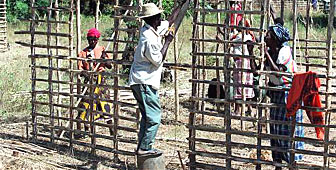Swiss see Mozambique as example for Africa

The Swiss Development Agency wants greater support for what it calls "the other Africa". At its annual conference in Biel the agency focused on Mozambique, currently enjoying peace, stability and economic growth after almost two decades of civil war.
Addressing the conference, the Swiss foreign minister, Joseph Deiss, warned against taking a pessimistic approach to Africa.
“There are many different faces to Africa,” he said. “Sierra Leone and the Congo are no more representative of Africa than Northern Ireland or Kosovo are representative of Europe. We must not forget that Africa has success stories, too.”
The Swiss Development Agency believes Mozambique could be one of those success stories. The country is a major beneficiary of Swiss aid money, receiving around SFr35 million ($20 million) a year.
Projects supported by Switzerland include improvements in the health, education and water systems, and programmes to train civilian police forces and promote local democracy.
Luisa Diogo, Mozambique’s minister for planning and finance, was invited by the Swiss Development Agency to attend the conference. She said help from abroad was very important to Mozambique.
“At the moment 50 per cent of our budget comes from foreign aid. But we are optimistic; we have achieved a lot already. The six million people displaced by the civil war have been resettled and most of them are working. And we have reduced inflation from 47 per cent in 1994, to four per cent in 1999.”
Diogo stressed that the main priority of her government was poverty reduction. “Over 50 per cent of our population still live in absolute poverty, and this is what we want to change. We have developed an action plan to tackle poverty, and Switzerland’s support in this area is very important.”
Nevertheless, last year’s devastating floods in Mozambique have slowed down some of the aid projects. “Unfortunately the floods affected the south of the country, where we had already established functioning health and education systems,” said Diogo. “Now, instead of continuing these improvements in the north, we have to start again in the south.”
Thomas Greminger, coordinator of the Swiss Development Agency’s programme in Mozambique, agreed that the floods had put the brakes on some projects, but argued that this was not a reason to give up.
“The floods are a setback,” he said. “But they won’t, as some have predicted, set development back for decades. We just need to look at how far Mozambique has come since the end of the civil war in the early 1990s to see how much potential this country has.”
Until last year’s floods Mozambique had the fastest economic growth of any country in Africa, and the country continues to attract foreign investment. At the end of this year the Swiss State Secretariat for Economic Affairs will be taking a delegation of Swiss business leaders to Mozambique to examine investment possibilities.
Rudolf Dannecker, deputy director of the Swiss Agency for Development, was optimistic that Switzerland’s aid to Mozambique would, in the long term, benefit both countries.
“We hope that within a few generations Mozambique will develop its economy, and although much of its future trade will probably be with South Africa, we look forward to having good trade connections with Mozambique, too.”
by Imogen Foulkes

In compliance with the JTI standards
More: SWI swissinfo.ch certified by the Journalism Trust Initiative
You can find an overview of ongoing debates with our journalists here. Please join us!
If you want to start a conversation about a topic raised in this article or want to report factual errors, email us at english@swissinfo.ch.